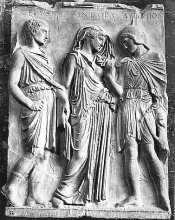
15 May 2006
GLUCK: Orfeo ed Euridice
Orfeo ed Euridice. Azione teatrale in three acts (Italian version).
Orphée et Eurydice. Tragédie opéra in three acts (French version).
Andromaca: Dramma per musica in three acts.
Ermione: Azione tragica in two acts.
Ippolito ed Aricia: Tragedia in five acts.
Idomeneo: Opera seria in three acts.
Paride ed Elena: Dramma per musica in five acts.
Orphée: Opera in four acts.
Music composed by Christoph Willibald Gluck (arranged by Hector Berlioz, 1859). Libretto by Ranieri de' Calzabigi
Alceste, ou Le triomphe d’Alcide: Tragédie en musique in a prologue and five acts.
Alceste: Tragédie opéra in three acts.
Medea: Melodramma tragico in three acts.
Oedipe à Colone: Tragédie lyrique in three acts.
Elektra: Tragedy in one act.
Fedra: Dramma per musica in two acts.
Les Troyens: Grand opéra in five acts.
Die Meistersinger von Nürnberg: Music drama in three acts.
Ariadne auf Naxos, Oper with a prologue and one act. Music composed by Richard Strauss. Libretto by Hugo von Hofmannsthal.
Der Schauspieldirektor [The Impresario], Singspiel in one act, K486.
Divertimento teatrale in one act.
Andrea Chénier, an opera in four acts.
La figlia del reggimento [La Fille du régiment (‘The Daughter of the Regiment’)], Opéra comique in two acts.
L’elisir d’amore, Melodramma giocoso in two acts.

Orfeo ed Euridice. Azione teatrale in three acts (Italian version).
Orphée et Eurydice. Tragédie opéra in three acts (French version).
Streaming Audio
| Composer: | |
| Christoph Willibald Gluck (1714-1787) | |
| Librettist: | |
| Ranieri de’ Calzabigi (Italian version) | |
| Pierre Louis Moline based on Calzabigi (French version) |
First Performance:
| Italian Version | 5 October 1762, Burgtheater, Vienna |
| French Version | 2 August 1774, Paris Opéra |
Principal Characters:
| Italian version | ||
|---|---|---|
| Orfeo | Alto Castrato | |
| Euridice, his wife | Soprano | |
| Amore | Soprano |
| French version | ||
|---|---|---|
| Orphée | Tenor | |
| Eurydice, his wife | Soprano | |
| Amour | Soprano |
Time and Place: Ancient Thrace
Synopsis:
Act I
A chorus of nymphs and shepherds accompany Orfeo around Euridice's tomb in a solemn chorus of mourning. Orfeo is only able to utter Euridice's name. Orfeo sends the others away and sings of his grief in the aria Chiamo il mio ben cosi, the three verses of which are interrupted by expressive recitatives. Amore (Cupid) appears telling Orfeo that he may go to the Underworld and return with his wife on the condition that he not look at her until they are back on earth. Orfeo resolves to take on the quest (in the 1774 version, both Amore and Orfeo have extra songs).
Act II
In a rocky landscape, the Furies refuse to admit Orfeo to the Underworld, and sing of Cerberus, canine guardian of the Underworld. When Orfeo, accompanied by his lyre (represented in the opera by a harp), begs for pity in the aria Deh placatevi con me, he is at first interrupted by cries of "No!" from the Furies, but they are eventually softened by the sweetness of his singing and let him in. In the 1774 version, the scene ends with the Dance of the Furies.
The new scene opens in Elysium. The 1774 version includes here the much-excerpted Dance of the Blessed Spirits (Reigen der seligen Geister) in which a chorus sings of their happiness in eternal bliss. Orfeo finds no solace in the beauty of the surroundings, for Euridice is not yet with him. He implores the spirits to bring her to him, which they do.
Act III
On the way out of Hades, Euridice is delighted to be returning to earth, but Orfeo, remembering the condition related by Amore in Act I, lets go of her hand and refuses to look at her. Euridice takes this to be a sign that he no longer loves her, and refuses to continue, concluding that death would be preferable. Unable to take any more, Orfeo turns and looks and Euridice; she dies. Orfeo sings of his grief in the famous aria Che farò senza Euridice?
Orfeo decides he will kill himself to join Euridice in Hades, but Amore returns to stop him. In reward for Orfeo's continued love, Amore returns Euridice to life, and she and Orfeo are reunited. All sing in praise of Amore (in the 1774 version, this finale is greatly expanded, including a ballet).